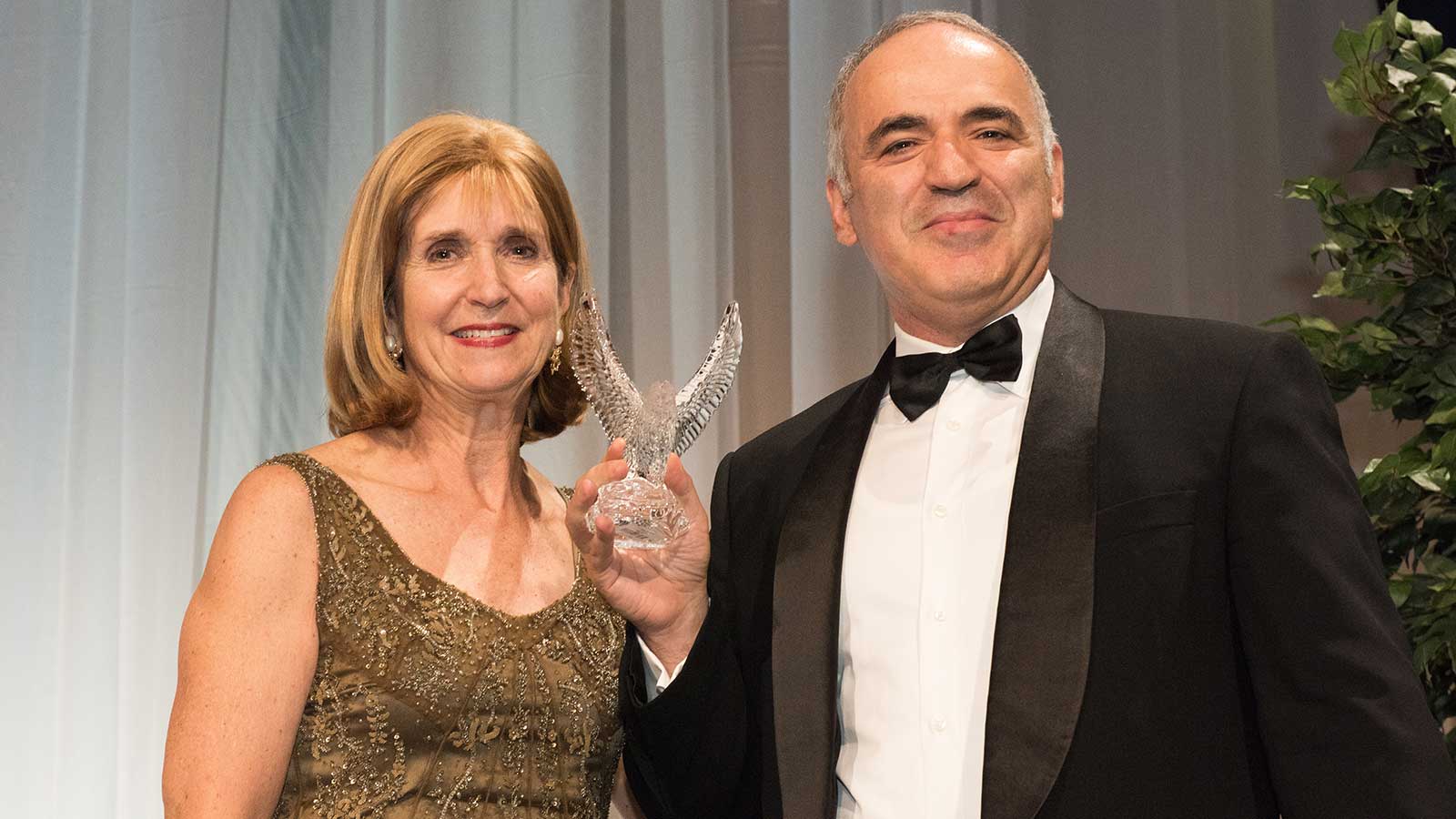
On Thursday, Sept. 28, Garry Kasparov accepted the 2017 Walter Judd Freedom Award during the TFAS 50th Anniversary Gala at the National Building Museum in Washington, D.C. As a pro-democracy activist on the world stage who has bravely spoken out against authoritarianism in his native Russia, Kasparov is a worthy recipient of this annual award recognizing individuals who have advanced the cause of freedom in the United States and abroad. In accepting his award, Kasparov delivered the following remarks before a crowd of nearly 800 TFAS alumni, supporters and friends who had gathered to celebrate 50 years of teaching the principles and values of freedom to rising generations.
I would first like to congratulate you all and everyone at The Fund for American Studies for this event and for your remarkable work in promoting the cause of freedom. Young people who are born in America, who are born in freedom, often fail to value these blessings, and your programs and events are so important to ensuring that this isn’t the case.
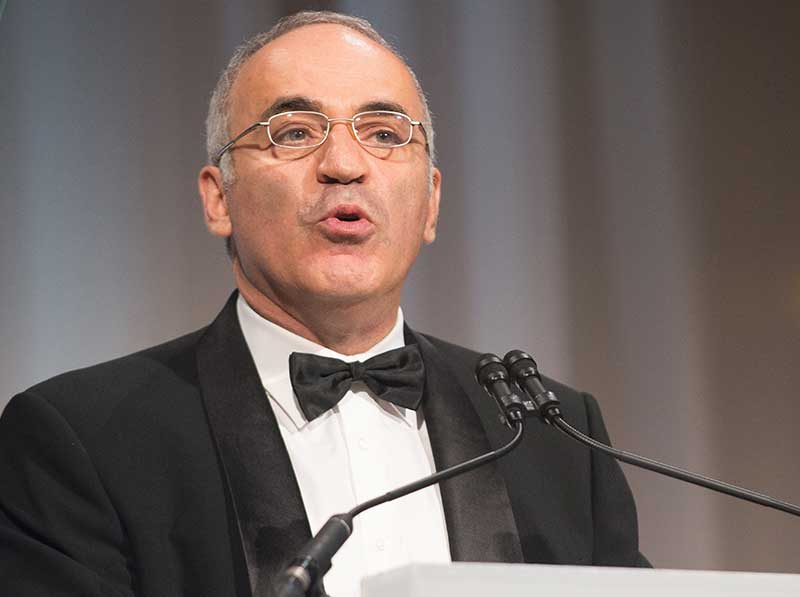
My deep thanks to The Fund for American Studies for this honor. To receive an award bearing the name of staunch anti-Communist Walter Judd, who received the Presidential Medal of Freedom from Ronald Reagan – it’s truly the honor of a lifetime for someone like me, who became what you might call a “Reagan Communist” in the Soviet Union in the early 1980s. I have many trophies in my cabinets, but none could mean more to me than one that has the word “freedom” on it.
It is a time of great division in American and global politics today, and people are nervous about partisan or ideological speeches. But I’m afraid it is against my nature to avoid it. However, my partisanship is not about one party versus another. No, my bias is free over unfree. My politics are democracy over dictatorship. My ideology is individual liberty over government authority. And I have no interest in the moral relativism of anyone who disputes these distinctions. If you want to defend Putin, do it from Moscow, not from Washington. If you want to defend socialism, do it from Caracas, not from Harvard.
It is a time of great division in American and global politics today, and people are nervous about partisan or ideological speeches. But I’m afraid it is against my nature to avoid it. However, my partisanship is not about one party versus another. No, my bias is free over unfree. My politics are democracy over dictatorship. My ideology is individual liberty over government authority.”
Certainly, Walter Judd understood that good and evil were not a matter for partisan debate. His passionate anti-Communism was not McCarthy’s political theater; it reflected Judd’s deep commitment to individual freedom abroad as well as at home. Judd was horrified that there were nearly a billion people living under authoritarian regimes around the world. No doubt he would be even more horrified that the number today is far higher, despite the collapse of the Soviet Union, the Evil Empire, over 25 years ago.
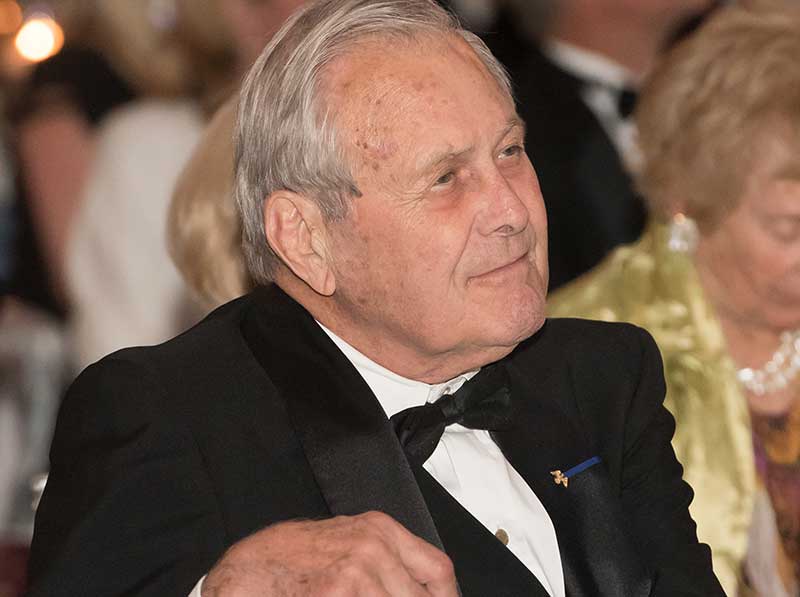
I believe that this is not a coincidence. When the Cold War ended in victory for America and the free world, and the Iron Curtain fell – rescuing me and millions more from totalitarian Communism – the West fell asleep. Exhausted after 45 years of battling an existential threat on multiple fronts, at huge cost, it was time to take a break. With the great enemy defeated, it was easy to lose focus. China, always Walter Judd’s passion, was still completely unfree, but China was happy to do business with America if the West would leave its brutal regime in peace, and America was increasingly content to drop human rights and freedom from the business plan. In 1992, a Baby Boomer became president and it was time to party. Well, the party is over.
Some here tonight might prefer not to talk about foreign policy at all. The global freedom agenda that once united Democrats like Scoop Jackson and John F. Kennedy with Republicans like Walter Judd and Ronald Reagan is barely represented in American politics today. And this is a tragedy, one whose consequences we are only starting to see realized. It is critical, because you cannot promote freedom abroad without a deep belief in freedom at home. And if you have that passion for freedom at home, you cannot help but believe that every man, woman, and child deserves that freedom too, even if they were born in China, North Korea, Russia, Zimbabwe, or Venezuela. And when there are failures the free world must do better, not give up.
You cannot promote freedom abroad without a deep belief in freedom at home. And if you have that passion for freedom at home, you cannot help but believe that every man, woman, and child deserves that freedom too, even if they were born in China, North Korea, Russia, Zimbabwe, or Venezuela. And when there are failures the free world must do better, not give up.”
American leadership is required to make that happen, and the best way to do that is by leading by example. America must again turn to what Walter Judd called America’s strongest weapons in his famous Chicago Republican Convention keynote in 1960. “The values and virtues of a system of government which has given freedom and dignity and better living standards to human beings than any other system ever has.” He added, “We must develop a strategy for victory!” And so, they did. And 29 years later, in 1989, the Berlin Wall fell to that strategy. But evil does not die, and today we again require a strategy for victory.
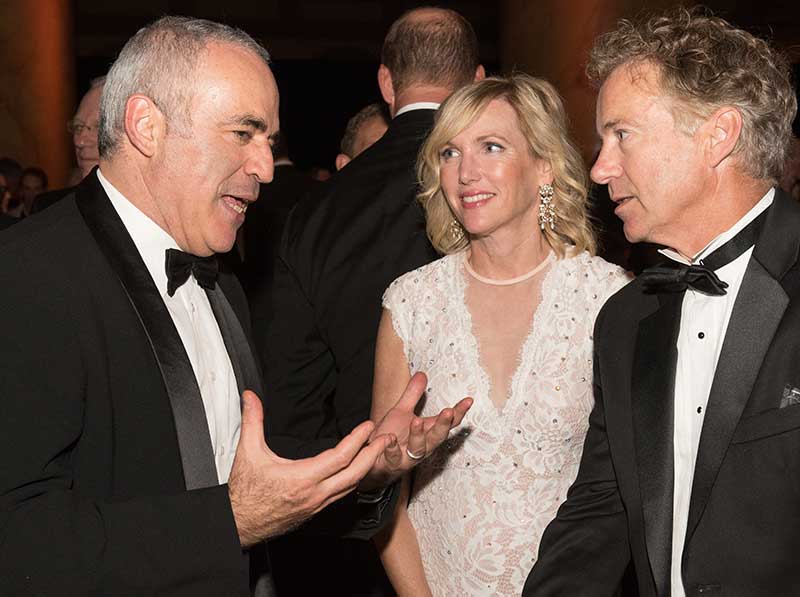
Yet today, right here in the United States, the proverbial land of the free, the shining city on a hill that shone so brightly to those of us in the unfree world, many want to turn away from the world and to turn away from liberty here as well. More regulations, more restrictions, more redistribution, more government involvement in education, in healthcare, in business, in social issues. It’s enough to make you wonder if the Soviets might still have a chance in the Cold War!
Different elements of these agendas are coming from different places. Nationalism that attacks globalism, immigration and free trade on one side. Socialism that attacks free markets, free thought and American exceptionalism on the other. In other words, attacking everything that made America great. And both groups seem to favor free speech only when that speech favors them – from conservative speakers attacked on college campuses to football players criticized for protesting. Defending only speech that suits you isn’t really free speech at all.
Talking about socialism in America is a luxury paid for by the successes of capitalism. The record is clear: Free markets and free people create prosperity while government control of resources and citizens create poverty.”
Most worryingly, both sides turn to the government for help. Ban this, stop that, promote this group, subsidize that one. NO! No, no, no. As Walter Judd said, again in 1960, “Many regard the Constitution as the means by which the government regulates the people. No, it is the magnificent means our forefathers devised by which the people can regulate their government. Rights are not what our government must do for us; rights are what our government cannot do to us.” I’m not a religious man, but amen! The good news is that, so far, the populist radicals on both sides seem quite incompetent. The bad news is that this means there is a huge opportunity for more capable, more charismatic, leaders to have even more success with these bad ideas in the future.
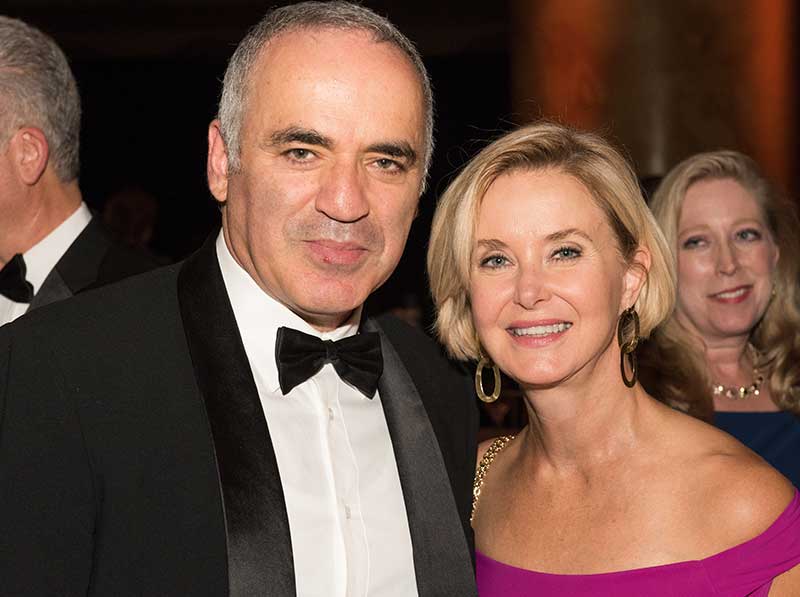
I have spent well over a decade warning about the threat of Vladimir Putin, and unfortunately, my warnings were not heeded. I will conclude with another set of warnings today and hope for better results. These warnings are based on my life experience in two dictatorships – the totalitarian USSR and the modern one-man dictatorship of Putin. And my life experience in the rise and fall of Russian democracy in the 1990s and my current life here in America, for which I am forever grateful.
One: Power given to the government is never returned without a fight, and it will be used in ways you cannot control and cannot expect. If you support conceding rights and giving authority to the government when the people or party you favor is in charge, you are part of the problem.
Two: Talking about socialism in America is a luxury paid for by the successes of capitalism. The record is clear: Free markets and free people create prosperity while government control of resources and citizens create poverty. Economic inequality is a serious issue, yes, maybe even the most important in the world one today. But trust me, you’re far better off with the failures of capitalism than with the “successes” of socialism!
My third and final warning is really a call to action for all of you here, a call not to follow, but to lead. Those who want America to be more like Scandinavia forget to ask, who will then be America’s America? Who will take risks, who will innovate and who will sacrifice for the prosperity and stability of the entire free world against its many enemies? No, America must lead, because there is no one else. And America must be led by those who truly believe in American values, American leadership and the American future. And that is the only strategy for victory. Thank you.
GARRY KASPAROV was born in Baku, Azerbaijan, in 1963, and became the under-18 chess champion of the USSR at the age of 12 and the world under-20 champion at 17. He came to international fame as the youngest world chess champion in history in 1985 at the age of 22. He defended his title five times, including a legendary series of matches against arch-rival Anatoly Karpov. Kasparov broke Bobby Fischer’s rating record in 1990 and his own peak rating record remained unbroken until 2013. His famous matches against the IBM super-computer Deep Blue in 1996-97 were key to bringing artificial intelligence, and chess, into the mainstream. His latest book, “Deep Thinking: Where Machine Intelligence Ends and Human Creativity Begins,” details his matches against Deep Blue, his years of research and lectures on human and machine competition and collaboration, and his cooperation with the Future of Humanity Institute at the University of Oxford. Kasparov has been a contributing editor to The Wall Street Journal since 1991 and is a frequent commentator on politics and human rights.

